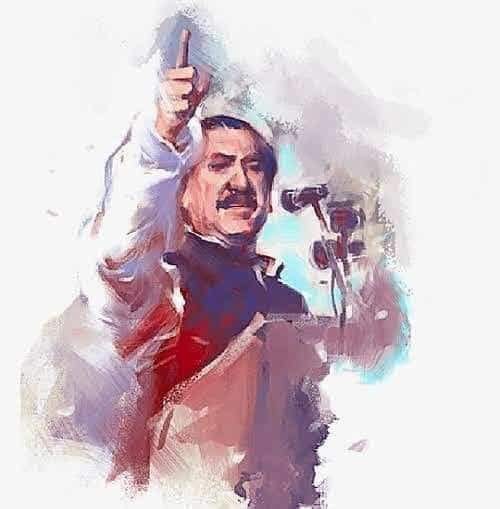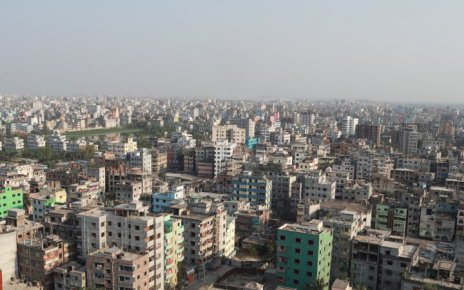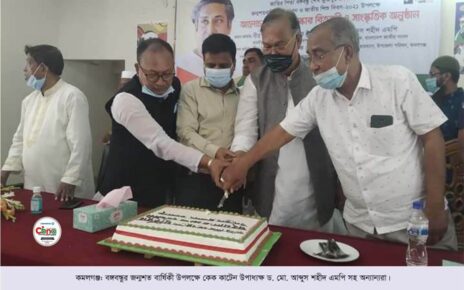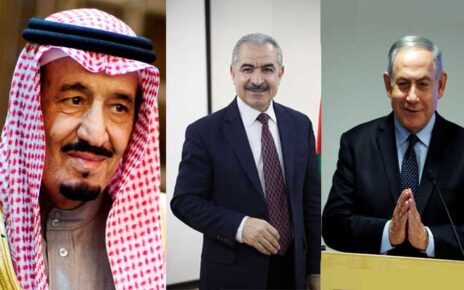Bangabandhu Sheikh Mujibur Rahman, the chief architect of Bangladesh
The whole nation of Bangladesh is celebrating the birth centennial of Bangabandhu Sheikh Mujibur Rahman with utmost respect and due solemnity. The Bangladeshi people living abroad are also celebrating the birth centennial of Bangabandhu Sheikh Mujibur Rahman with due solemnity. Due to the outbreak of the Global Pandemic of Corona virus (COVID-19), mass public gatherings were postponed for the safety of the people in this regard for the time being. Bangabandhu Sheikh Mujibur Rahman is called the chief architect and the father of the nation of Bangladesh. Bangabandhu Sheikh Mujibur Rahman was born on 17 March 1920 at Tungipara, a village in Gopalganj District in the province of Bengal in British India, to Sheikh Lutfur Rahman. He served as the first President of Bangladesh and later on as the Prime Minister of Bangladesh. He is considered to be the indomitable driving force behind the independence of Bangladesh in 1971. As a person, Bangabandhu Sheikh Mujibur Rahman stood out as a towering figure coupled with undaunted spirit who shouldered the hopes of the millions of people through difficult times. He is popularly dubbed with the title of “Bangabandhu” means “Friend of Bengal” by the people of Bangladesh because of his true love and sacrifice for Bangladesh and its people. He became a leading figure and eventually the leader of the Awami League, founded in 1949 as an East-Pakistan based political party in Pakistan. Mujib is enormously credited as an important figure in efforts to gain political autonomy for East Pakistan and later on as the central figure and chief architect behind the Bangladesh Liberation Movement and the Bangladesh Liberation War in 1971. His daughter Sheikh Hasina is the current leader of the Awami League as well as he Prime Minister of Bangladesh.
Bangabandhu’s brave hearted public life started as a simple schoolboy. And it never stopped till his brave hearted last breath when he, along with all members of his immediate family, except the two daughters Hasina and Rehana, were brutally assassinated on 15th August 1975. Throughout his life he dedicated every bit of his energy, the entirety of his thoughts and aims and every ounce of his emotion to one single dream which could only be achieved through independence of Bangladesh as well as the betterment of his people. It was his undaunted ability to unify the people that made us come together and his outstanding capability of mesmerising people with his fierce words and glorious oratory that made us bold and honesty of his purpose that made us trust him so completely.
As a student at the college, Mujib started his political life in 1940 by joining the All India Muslim Students Federation. In 1943 he joined the Bengal provincial branch of All India Muslim League [popularly known as the Muslim League], a political party known for its strong advocacy for a Muslim-majority state of Pakistan. He completed his Bachelor of Arts Degree from Islamia College in central Calcutta in 1944. In 1949, after two years of the partition and subsequent establishment of Pakistan, politicians of East Pakistan broke away from the Muslim League and established the All Pakistan Awami Muslim League as Mujib was elected as one of the party’s joint secretaries at the age of only 29. In 1966, the Awami League, led by Bangabandhu Sheikh Mujibur Rahman, proposed the Six Point Programme at the National Convention in Lahore of Pakistan which sought to bridge the disparity between the two provinces of Pakistan and provide significant autonomy of administration for East Pakistan. The proposal was rejected and denounced by the ruthless ruling government in West Pakistan, for they feared it might instigate the splitting of Pakistan. Due to the deteriorating rights and sufferings of Bengali speaking people in Pakistan and huge economic exploitation and disparity between East and West Pakistan, Bangabandhu Sheikh Mujibur Rahman courageously led a passionate nationalist movement for exploited and suffered Bengali speaking people which eventually led to the glorious formation of Independent Bangladesh in 1971
The Awami League, under the dynamic leadership of Bangabandhu Sheikh Mujibur Rahman, swept to a landslide victory in Pakistan’s 1970 general election. However, the National Assembly failed to convene on Mar 3, 1971 to swear in the new Prime Minister (who was Bangabandhu Sheikh Mujibur Rahman), because the then dictator President of Pakistan, General Yahya Khan and rival party leader, Zulfiqar Ali Bhutto vehemently opposed a ruling party from East Pakistan as part of their conspiracy theory. Following political deadlock, President Yahya Khan delayed the convening of the assembly – a move seen by Bengalis as a notorious conspiracy to deny Mujib’s party named Awami League, which won majority of seats, from forming the Government. It was on 7 March 1971 that Bangabandhu called for the preparation of independence and courageously asked the people of Bangladesh to launch a major campaign of civil disobedience and organized armed resistance at a mass gathering of people held at the Race Course Maidan in Dhaka. His speech on Mar 7, 1971 in front of more than 1 million people in Dhaka has been touted as a pinnacle moment of the independence struggle of Bangladesh. It also took plenty of courage and determination to face unsurmountable odds, especially in a political environment where life was at the mercy of those who ruled Pakistan with iron hand without democratic rule of law. His landmark speech is considered the first indirect announcement of the country’s “liberation war”. Bangabandhu courageously said by defying Pakistani warning and provocation “Since we have given blood, we will give more blood. God-willing, the people of this country will be liberated … Turn every house into a fort. Face (the enemy) with whatever you have. The struggle now is the struggle for our emancipation; the struggle now is the struggle for our independence. Joy Bangla!.”
His unwavering courage spread through the ranks of the resistance groups in East Pakistan to fight against the crimes and genocides committed by the Pakistani army. The Bangladesh Liberation War had resulted in 3 million casualties and deaths and displaced more than 10 million Bengalis who fled to neighbouring India. The cost of the war was unsurmountable. Time Magazine reported in 1972: “In the aftermath of the Pakistani army’s rampage last March, a special team of inspectors from the World Bank observed that some cities looked ‘like the morning after a nuclear attack.’ Since then, the destruction has only been magnified. An estimated 6,000,000 homes have been destroyed, and nearly 1,400,000 farm families have been left without tools or animals to work their lands.”
Despite the overwhelming setbacks, Bangabandhu Sheikh Mujibur Rahman took it upon himself to steer Bangladesh out of its predicament after liberation of Bangladesh in 1972. His charismatic leadership and his true love for Bangladesh provided the much-needed confidence for its people to reconstruct the battered country after independence of Bangladesh. Bangabandhu Sheikh Mujib embarked on a Nationalization program to rehabilitate the estimated 10 million refugees and revitalised the nation’s economy through state investments into rural infrastructure, agriculture and cottage industries. Unfortunately, on August 15, 1975 some evil Bengalis as well as a fraction of the Pakistani minder army, assassinated him with almost all of his family members. We deeply mourn the death of Bangabandhu Sheikh Mujibur Rahman by paying glowing tribute to Him.
As a person, Bangabandhu Sheikh Mujibur Rahman stood out as an outstanding figure who shouldered the hopes of the millions through difficult times. Senior Awami League leader and former Commerce Minister Tofail Ahmed said, “The greatest achievement of Bangabandhu Sheikh Mujibur Rahman was that he congregated the people of Bangladesh and declared liberation.” Tofail Ahmed further said “His sole dream was to free Bangladesh from the misrule of Pakistan. He is a great leader who never compromised with oppression.” Syed Anwar Hussain, a historian at the University of Dhaka, told Anadolu Agency that Bangabandhu had a multidimensional personality. In a 2004 BBC Bengali opinion poll, Mujib was voted as the “Greatest Bengali of All Time”. Cuban leader Fidel Castro compared Mujib’s personality with the Himalayas during the Non-Aligned Summit in 1973. In 30 October 2017, UNESCO recognised Mujib’s 7th March Speech as part of the world’s documentary heritage. With love and respect, I pay my glowing tribute to this multidimensional personality and the father of the nation of Bangladesh, Bangabandhu Sheikh Mujibur Rahman on his centennial birth anniversary.
Source: Wikipedia and translation ( Bangabandhu Sheikh Mujibur Rahman, the chief architect of Bangladesh )




